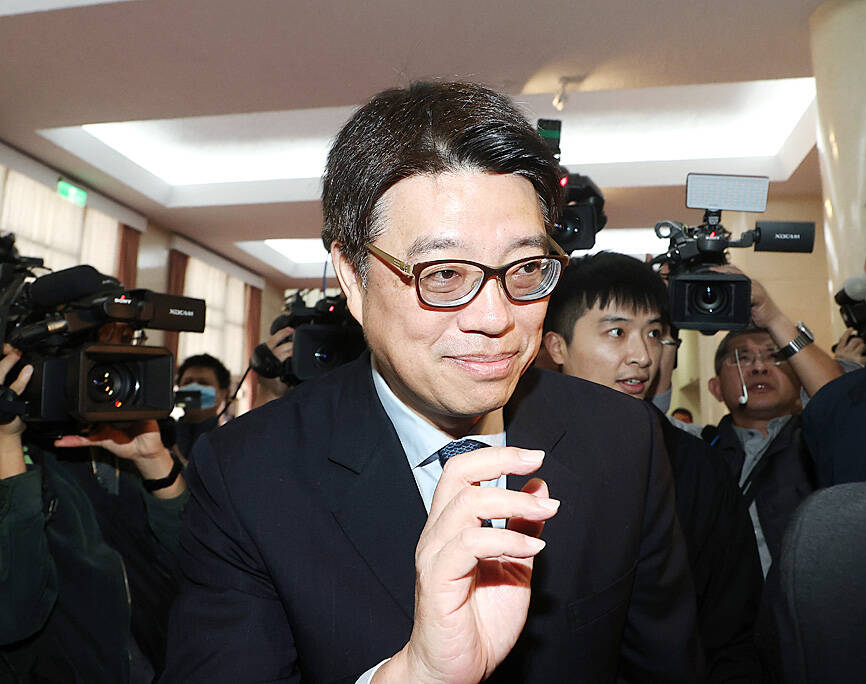The Mainland Affairs Council (MAC) yesterday defended its decision to administer a survey among government workers, teachers and military personnel asking if they have Chinese ID cards, passports or residency cards, saying it is necessary to counter China’s “united front” work.
The survey requires government workers to sign an affidavit saying that they have never had a registered household in China, Chinese passport, ID card, permit for Taiwan residents or permanent resident ID card.
The survey has sparked complaints among lower-ranking government workers.

Photo: CNA
“The government must tackle Beijing’s increasingly aggressive campaign to destroy the status quo of the Taiwan Strait and disregard cross-strait agreements. As it is impossible for the Chinese government to voluntarily provide information of Taiwanese applying for Chinese ID cards or passports, we need to ask government workers if they have contravened the law,” the MAC wrote on Facebook.
Government workers, teachers and military personnel can sign an affidavit to “demonstrate their loyalty” to the country, the MAC said.
“After a careful evaluation, we determine that the survey is a proper course of action, as it imposes the lowest administrative costs on organizations and schools, and causes least disruption of government workers’ lives,” the council said.
The Act Governing Relations Between the People of the Taiwan Area and the Mainland Area (臺灣地區與大陸地區人民關係條例) stipulates that civil servants would lose their government jobs once they obtain Chinese citizenship, it said.
The government must address Beijing’s attempts to integrate Taiwan into its social and economic systems, the council said, adding that some civil servants have been found to have Chinese ID cards.
The permanent resident ID cards and resident permits that Beijing issues to Taiwanese look almost the same as Chinese ID cards, which is Beijing’s way to say that Taiwanese are Chinese citizens, the council said.
“It is also part of China’s evil united front work that attempts to show Taiwan as its internal affair, negate the sovereignty of the Republic of China, Taiwan, and create an illusion that it has authority over the nation,” the council said, adding that government workers, teachers and military personnel must not disobey the government’s cross-strait policy and not take part in Beijing’s “united front” work.
Separately, the council on Monday night in a statement said that military-age men who have Chinese ID cards remain to be obliged to serve mandatory military service.
The cross-strait act stipulates that Taiwanese who have household registration in China or a Chinese passport would be deprived of their status and rights.
Their household registrations in Taiwan would be annulled, the act stipulates.
However, the act also says that they are not exempt from fulfilling responsibilities and obligations of Taiwanese, the MAC said.
The purpose of such regulation is to prevent military-age men from avoiding mandatory military service by switching to Chinese nationality, the MAC said.
The Nationality Act (國籍法) also bans military-age men who have not served mandatory military service from renouncing their nationality, it said.
About 100 military-age men who might have Chinese ID cards or household registrations in China are obliged to serve mandatory military service in Taiwan, Ministry of the Interior data show.

Taiwan is to have nine extended holidays next year, led by a nine-day Lunar New Year break, the Cabinet announced yesterday. The nine-day Lunar New Year holiday next year matches the length of this year’s holiday, which featured six extended holidays. The increase in extended holidays is due to the Act on the Implementation of Commemorative and Festival Holidays (紀念日及節日實施條例), which was passed early last month with support from the opposition Chinese Nationalist Party (KMT) and Taiwan People’s Party. Under the new act, the day before Lunar New Year’s Eve is also a national holiday, and Labor Day would no longer be limited

Taiwan is to extend its visa-waiver program for Philippine passport holders for another year, starting on Aug. 1, Minister of Foreign Affairs Lin Chia-lung (林佳龍) said on Friday. Lin made the announcement during a reception in Taipei marking the 127th anniversary of Philippine independence and the 50th anniversary of the establishment of the Manila Economic and Cultural Office (MECO) in Taiwan, the Ministry of Foreign Affairs said. The decision reflected Taiwan’s commitment to deepening exchanges with the Philippines, the statement cited Lin as saying, adding that it was a key partner under the New Southbound Policy launched in 2016. Lin also expressed hope

Costa Rica sent a group of intelligence officials to Taiwan for a short-term training program, the first time the Central American country has done so since the countries ended official diplomatic relations in 2007, a Costa Rican media outlet reported last week. Five officials from the Costa Rican Directorate of Intelligence and Security last month spent 23 days in Taipei undergoing a series of training sessions focused on national security, La Nacion reported on Friday, quoting unnamed sources. The Costa Rican government has not confirmed the report. The Chinese embassy in Costa Rica protested the news, saying in a statement issued the same

Temperatures in New Taipei City’s Sindian District (新店) climbed past 37°C yesterday, as the Central Weather Administration (CWA) issued heat alerts for 16 municipalities, warning the public of intense heat expected across Taiwan. The hottest location in Taiwan was in Sindian, where the mercury reached 37.5°C at about 2pm, according to CWA data. Taipei’s Shilin District (士林) recorded a temperature of 37.4°C at noon, Taitung County’s Jinfeng Township (金峰) at 12:50 pm logged a temperature of 37.4°C and Miaoli County’s Toufen Township (頭份) reached 36.7°C at 11:40am, the CWA said. The weather agency yesterday issued a yellow level information notice for Taipei, New